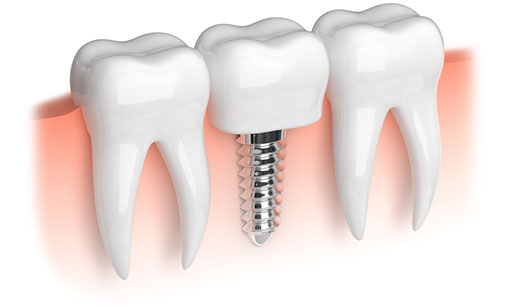Dental implants are osseointegrated synthetic roots.
They can be used to replace one or several teeth, or all of the teeth.
The implants are then used as support for a fixed cosmetic prosthesis (crown or bridge) or to stabilise dentures.
After a pre-implant consultation, a panoramic x ray and an in-surgery scan, the dental implants are fixed into place under local anaesthetic in a dedicated room.
The permanent fixed prosthesis (crown or bridge) will be attached to the implant three to six months later, in the meantime a temporary prosthetic will be worn.
Dental implants are a reliable solution with a 90 % success rate over the past 20 years.
Dental implants are a lasting solution which allow healthy teeth and maximal stable bone tissue to be preserved.
Dental implants provide a fixed prosthesis for all ages with a cosmetically pleasing and comfortable result.
Dental implants carry some contraindications.
1. Absolute Contraindications
– cardiac pathologies
- valvular heart disease and prosthetic valve surgery
- recent myocardial infarction
- heart failure
- cardiomyopathy
– stroke (cerebral vascular accident)
– evolutionary cancer
– bone diseases [Brittle Bone disease (osteogenesis imperfecta), Paget’s disease, osteomalacia …]
– AIDS
– orthopedic prostheses users
– immunological diseases and treatment by immunosuppressant
– drug and alcohol abuse
– severe psychiatric disease (some)
– treatment of osteoporosis and certain cancers by bisphosphonates (even years later)
– children (against-indication before the growth of the maxilla) 17/18
Source : Department of Periodontics and Oral Medicine, School of Dentistry, University of Michigan, Ann Arbor, MI 48109-1078, USA.
Medical contraindications to implant therapy: part I: absolute contraindications. Hwang D, Wang HL. http://www.ncbi.nlm.nih.gov/pubmed/17172952
2. General Contraindications
– Age (aging)
– osteoporosis
– smoking
– diabetes
– genotype interleukin-1 positive
– cardiovascular diseases (angina)
– hypothyroidism
– pregnancy
– psychiatric diseases (Dental implant treatment for patients with psychiatric disorders.Addy L, Korszun A, Jagger RG.SourceBristol Dental School.)
Source : Department of Periodontics and Oral Medicine, School of Dentistry, University of Michigan, Ann Arbor, MI 48109-1078, USA.
Medical contraindications to implant therapy: Part II: Relative contraindications. Hwang D, Wang HL http://www.ncbi.nlm.nih.gov/pubmed/17356368
3. Relative local contraindications:
– insufficient bone density
– oral and Periodontal Disease
– severe bruxism
– dental infections (cysts, granulomas …)
– poor oral hygiene
Source : Department of Oral and Maxillofacial Surgery, University of Florida College of Dentistry, 1600 SW Archer Road, Room D7-6, Gainesville, FL 32610, USA. wmartin@dental.ufl.edu
Local risk factors for implant therapy.Martin W, Lewis E, Nicol A
http://www.ncbi.nlm.nih.gov/pubmed/19885433?log$=activity
Source :College of Dentistry, The Ohio State University, Columbus, Ohio, USA. melaniew@mb.sympatico.ca
A review of selected dental literature on evidence-based treatment planning for dental implants: report of the Committee on Research in Fixed Prosthodontics of the Academy of Fixed Prosthodontics.
Wood MR, Vermilyea SG; Committee on Research in Fixed Prosthodontics of the Academy of Fixed Prosthodontics
4. Complications of dental implants:
As with any surgical procedure, the placement of a dental implant may cause complications. The following complications are rare but can occur:
– anesthetic risk
– no osseointegration of the implant
– infections
– nerve damage
– hemorrhage
– late failure of the implant
– implant migration in sinus cavity
Source: http://www.fondationimplants.ch/pdf/zahnbrosch_fz.pdf
Written on the 11th of January 2016











